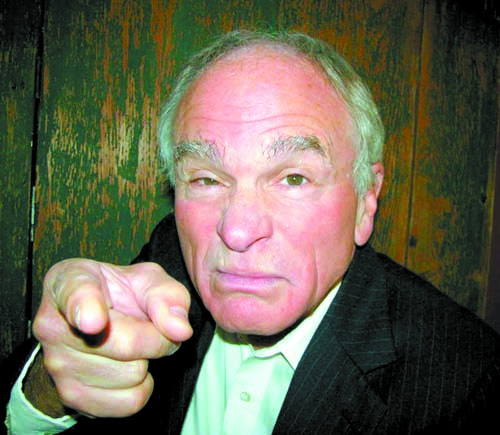Enjoy a laugh with Scrooge

• Denmark Arts Center (50 West Main Street)
• Saturday, Dec. 14, 7 p.m. The show is 1 hour, 40-45 minutes including intermission (Snow date, Dec. 15, 2 p.m.)
• Tickets: $12 and up
• Telephone: 452-2412
• www.denmarkarts.org
By Wayne E. Rivet
Staff Writer
Like Charles Dickens, Will Rhys of Bridgton believes laughter is good for everyone.
“We need to laugh,” the longtime actor said.
Rhys hopes to draw more than a few chuckles while also putting area residents into the holiday spirit this Saturday night with his one-man presentation of “A Christmas Carol” at the Denmark Arts Center.
The News caught up with Rhys earlier this week as he prepared for the only showing of the Christmas classic to talk about his career and the DAC show:
Q. How did you become interested in acting?
Will: The joke was that I was a pre-med student and it came around my junior year when I started thinking about the med boards and schools. I realized this wasn’t going to work for me. The medical profession doesn’t need me. I had been doing some work in the theatre, where I had gone to school, and the professor there encouraged me. My parents were happy. My mother said, ‘Thank God you decided to do this because you were always miserable when you came home for vacation because all you did was study. Now, you come home, there is a person there. There was great support. My mother had done local theatre while I was growing up in Massachusetts. I did a few shows because they needed a child…I’m a bit of a ham. I don’t mind being in front of people. It worked out very well. I’ve done nothing but jobs related to the theater (either teaching it or participating in some way) for my entire life, except one summer when I painted buildings because I had to…I can’t claim that I made a huge amount of money (in theatre), but I can claim to have done nothing but what I have a passion for. You never retire because someone has to play grandpa. I have a very supportive wife (Nancy).
Q. How did you move to Bridgton?
Will: Nancy’s grandparents had a business here. Her cousins live here. Thus, Nancy has always wanted to retire to Bridgton. I’m not going to argue. It was a bit of a shock, not where I live, but I’ve always lived in cities. Until I met my wife, I never owned a home. I was on the move all the time. I worked in theatres all over the country. Yes, I lived in New York City for a while because it was a base (I did work on Broadway), I was all over the place, even Monmouth (directing some shows at the Shakespeare Festival) before I moved up here in early 2000s (built a home and the family has a camp on Highland Lake). I have the best of everything — a home on the lake, a home in the woods, and a great bunch of friends, which is exciting to be doing this show at Denmark Arts because there is no excuse not to see it.
Q. You’re excited about taking the show to Denmark?
Will: I am. I’ve done it in Bridgton several times in different places (Bridgton Academy, the middle school). The first time was in the Magic Lantern pub…It’s coming home. It’s the only show I am doing this year.
Q. How did you know it was the right decision to focus on theatre?
Will: I have been very lucky. When I was in graduate school, a friend of mine called me and said there was a theatre company that is being developed (in Connecticut). It’s a group of deaf actors. They were going to have a school to train actors. They were looking for to teach acrobatics. I was a gymnast. I used that skill to my advantage in many shows that I have done. I was recommended. I said sure. I enjoyed it. I was doing theatre right away, but in a totally new experience (learning sign language). I toured all over the world with this company, across the United States eight times (over four years). I saw places that I have never gone back to or would never have gone to. I knew this was the right choice for me. I was doing something positive. I was on the cutting edge so how could I not enjoy it. It got me my next job, someone saw me while on tour.
Q. Was it tough landing roles?
Will: You don’t want to sugarcoat it — it’s a hard business to succeed in. You have to define what success means to you. Mine, I was constantly working, exploring roles, meet people. I’ve done one TV movie, never done television. Live theatre was always my interest. You need to learn to accept rejection because it is going to happen more than you being accepted…Sometimes, you won’t be right for that individual (who makes the decision), at that time for that role. You keep developing what makes you so special. You have to be hard on yourself. You have to be realistic about your expectations.
Q. How did you evolve as an actor?
Will: Not try to be everything that the individual for whom I am auditioning for wants. One has to be comfortable in one’s own skin. You have value as an individual. You are important. You have to develop your skills. You have to figure out what you need to do to be more valuable. If you are going to be in the theatre business, you have to explore the world around you (reading). Like to study. It’s not just memorizing lines. That’s the easiest thing. You have to get into why the author wrote them that way. My studies in college as a biology major taught me discipline, system, focus and direction, which helped me as an actor…All the stuff that surrounds you on a daily basis influences the way you behave, the way you perform, and the way you produce. Don’t stunt your growth.
Q. Did you study how others played the role of Scrooge and others in The Christmas Carol?
Will: Yes. Twenty-five or 30 years ago, Patrick Stewart developed a one-may Christmas Carol and brought it to Broadway. It was remarkable. I didn’t see it. I heard it (CD). It does work. I went back and studied Dickens and his performance. My friend, who played Scrooge, gave me an edition of Christmas Carol that had all of Dickens’ cuts that he used when he presented it. All of the texts as a basis to start from. I went back to Dickens. Every year I do Christmas Carol, it’s different. Not hugely, but I always change the dialogue. I look for evidence that will inform my understanding what happens to Scrooge over the course of the performance.
Q. How difficult is it to play every character?
Will: The hardest thing is to make myself believe I was doing something that was interesting for other people to watch. The first performance at the pub told me a great deal that it does work. There was interest. I had to prove it to myself. Along the way, I had good friends find me find venues in which I could perform it. It’s a simple set — two chairs, a stool (they later become fireplaces and gravestones, which allows the audience to use their imagination), a scribner’s desk (people stood behind and wrote on), which a friend of mine in Buxton made for me. The first one, I made myself, but it was lost in a fire at my house (in a garage). There is music and sound, as well. My brother is a composer in the theatre. He’s done the music and sound. He lives in Portland now. There is a new cue in there. I like to add little tweaks, and I find it by going back to the texts. I always find something I hadn’t seen, and put it in. It stays fresh.
Q. When do you start rehearsing?
Will: A month, now. The first time, I worked on it for about half the year because I was working on the text — what worked, what didn’t work. My brother and wife were very good letting me know if I went too fast. Slow down. A friend, Dustin Tucker of Portland Stage Company, came out and watched and gave me great feedback. They often told me to relax, trust it. Trust yourself. Trust the material. Trust the audience to get what you are doing. The character changes are wonderful, but just trust them. It’s fun to see one person be Scrooge’s sister and then turn around to be the Ghost of Christmas Past. There are conversations between two characters so it took me a while to figure out the technique to make that work. It wasn’t just change of voice, but also change of attitude, intent and posture. It’s really not something I’ve had to do in any other show.
Q. Since people know the story, is there a high degree of expectation?
Will: I think I’ve discovered how funny the story really is. Scrooge is a comical, old gent. Dickens had a point about poverty and how the poor were treated and the spirit throughout the year had been suppressed. He’s also is aware that we as humans need a release, and it is laughter. It’s a necessary part of us. Laughter is good for us. We need to laugh. My pet peeve of adaptations of Christmas Carol is that they are too elaborate. Consequently, the story gets lost. I have a costume. We do have lights. What makes I work is that you use your imagination. I respect that the audience will rise to the occasion and go on this journey with me.
Q. It must by as much a physical challenge as it is a mental challenge playing all those roles over an hour, 45 minutes?
Will: It’s tiring. I keep active. All of the sports I played other than rugby were individual sports. I was a diver, gymnast, a wrestler, a pole vaulter and a marathon runner. I’ve hiked a lot here. I never did it until I met Nancy. Little did I know that it meant climbing upward. Now, we’re biking too. I’m used to having to rely on myself. My idol is Mick Jagger, who was a runner. He ran six miles a day. For him to do what he does on a stage, let alone that he can sing, and he survived a heart issue was because he was in shape. I’ve always believed that an actor needs to take care of his instrument — and the instrument is not just the voice, it’s the entire body.
Q. Despite all the shows you have done, do you still get nervous?
Will: Yeah, I do. The way I’ve adapted this piece is that I read from a text first so I’m not out there trying to remember my opening lines, I’m just reading. I’m looking forward to doing it Saturday with my friends. Denmark Arts Center will be a good place to do it — it has a sweet little stage.


